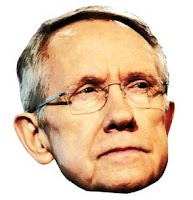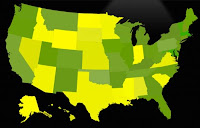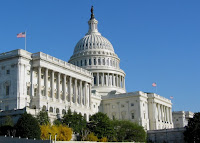Getting a Reid on the Situation: On the “Prohibition of Internet Gaming, Internet Poker Regulation and UIGEA Enforcement Act”
 You’ve no doubt heard by now that Sen. Harry Reid (D-NV), currently the Senate Majority Leader, has proposed a new bill in the Senate that has gotten those of us who enjoy online poker sitting up in our chairs. There had been rumors of an attempt to pass some type of online gambling-related legislation during this brief “lame duck” session of Congress, and the appearance of Reid’s bill appears to have confirmed such rumors as having been well-founded.
You’ve no doubt heard by now that Sen. Harry Reid (D-NV), currently the Senate Majority Leader, has proposed a new bill in the Senate that has gotten those of us who enjoy online poker sitting up in our chairs. There had been rumors of an attempt to pass some type of online gambling-related legislation during this brief “lame duck” session of Congress, and the appearance of Reid’s bill appears to have confirmed such rumors as having been well-founded.A draft of the 75-page bill became available late last week, and if you have an interest in these things I encourage you to take a look at F-Train’s “quick and dirty” summary of the bill, to follow Pokerati’s ongoing reporting on it, to read B.J. Nemeth's “Early Analysis,” and/or to check out the Poker Legislation forum over at Two Plus Two to find out more about the bill as well as to keep up on what’s happening with it.
My understanding is that even though the proposed bill is comprehensively argued and full of detail -- in other words, more carefully composed than was the Unlawful Internet Gambling Enforcement Act of 2006 -- it is nonetheless still a draft version and apparently changes have already been made prior to its receiving any discussion or vote.
Like the Barney Frank-sponsored bills that have come before, Reid’s bill also proposes a way to license and regulate online gambling in the United States -- that is, to allow operators to set up shop here in America, if they play along with all the provisions and secure themselves licenses to do so -- one big difference being that Reid’s bill only allows for poker and not other forms of gambling.
In fact, Reid’s bill does more than simply outline a scheme to license and regulate online poker; it also seeks to reinforce current efforts to curb other types of online gambling, including strengthening that poorly-constructed UIGEA with some more specifics such as creating a list of “unlicensed gambling enterprises” so the banks know for certain the sites with which they are supposed to be blocking their customers’ transactions.
Thus is the bill’s short title -- “Prohibition of Internet Gaming, Internet Poker Regulation and UIGEA Enforcement Act” -- is already kind of long, indicating the extensive ambitions it contains.
 The scuttlebutt appears to suggest the possibility that the bill could get tacked on to some other legislation and passed through Congress without extensive fuss, not unlike what occurred with the UIGEA back in the fall of 2006. Or at least that is the most likely short-term scenario by which Reid’s bill will become law, since the current Congress is occupied with more pressing concerns such as whether or not to extend those “Bush-era tax cuts” in some form or another.
The scuttlebutt appears to suggest the possibility that the bill could get tacked on to some other legislation and passed through Congress without extensive fuss, not unlike what occurred with the UIGEA back in the fall of 2006. Or at least that is the most likely short-term scenario by which Reid’s bill will become law, since the current Congress is occupied with more pressing concerns such as whether or not to extend those “Bush-era tax cuts” in some form or another.I’m not going to attempt to make any sort of exhaustive analysis or summary of the bill in its current form, both because of its status as a draft and because (as always) I feel somewhat out of my element when it comes to understanding the legislative process. Sure, I’m a good enough reader, but this stuff almost never translates into something entirely coherent and/or logical. To my jingle-brain, anyway.
I will, however, share three kind of general reactions to the news of Reid’s bill.
First off, it does not sound as though the bill if passed would be such great news to any of the current “U.S.-facing” online poker sites -- most particularly the two largest ones, PokerStars and Full Tilt Poker -- all of whom apparently will be swiftly swept away from the U.S. market for an extended period of time should Reid’s bill become law.
The bill as written requires that no licenses to operate online poker sites in the U.S. will be issued until 15 months after the bill becomes law. Furthermore, the bill includes provisions to prevent issuing licenses to anyone but U.S.-based casino operators (or other business entities who have been involved in the industry here in the states for five years or more) for the first two years after that. In other words, Stars, Full Tilt, Cake, the Cereus delinquents, and others would all have to sit in the penalty box (so to speak) for at least 39 months before coming back to the U.S.
The idea here is obviously to try to develop this new market of online poker in the U.S. in such a way as to ensure its primary beneficiaries are U.S.-based (and, not incidentally, significant backers of Reid’s campaigns).
Have to say, the prospect of suddenly losing Stars or Full Tilt does not excite me much. Nor does sitting around for a couple of years or more waiting to get back online to play on other sites make me feel any better about that situation. So that’s one response -- perhaps inspired by short-term thinking, but hard to avoid.
 A second reaction is to fret a bit over all the ways states can “opt-in” or “opt-out” when deciding whether or not to allow licensees to operate. In other words, even with online poker becoming licensed and regulated in the U.S., I wonder if my state will still keep me away from the tables.
A second reaction is to fret a bit over all the ways states can “opt-in” or “opt-out” when deciding whether or not to allow licensees to operate. In other words, even with online poker becoming licensed and regulated in the U.S., I wonder if my state will still keep me away from the tables. Added to that are other less crucial concerns about taxation and other specifics that might introduce unwanted changes to the way I play online poker today. I’m not saying I don’t want to pay tax on my winnings -- I do that already. Rather, I’m uncertain about how regulation might negatively affect both my own experience playing and perhaps that of others, too.
I suppose, then, you can file these first two reactions under the general heading of “resistance to change,” with a bit of cynicism thrown in there, as well, inspired by the thought of our federal government successfully managing the complicated process of licensing, regulating, and taxing online poker.
I have one other reaction, too, to share, namely some doubts about whether or not Reid will be able to sneak his bill through during these final days of the 111th Congress.
I could be wrong -- indeed, understanding the political realities affecting the legislative process is perhaps the most nebulous part of all of this for me. But it seems like the situation Reid faces is much different than the one then-Senate Majority Leader Bill Frist enjoyed back in 2006 when he played a major role in getting the UIGEA signed into law.
We all remember how the UIGEA was stealthily appended to that “must pass” legislation, the SAFE Port Act, back in 2006 just as the 109th Congress was closing up shop for that fall’s elections. (Incidentally, I have read analyses of the SAFE Port Act that are critical of it as having been -- like the UIGEA -- mostly impotent with regard to its intended purposes.) We were right to criticize the lack of debate in Congress at the time over the UIGEA in particular -- to feel something undeserved had occurred, somehow, as though we’d played our hand reasonably well and were nonetheless sucked out on in the end.
 The SAFE Port Act (with the UIGEA) was passed by Congress late in the evening of September 30, 2006, then later signed into law by President Bush on October 13th. In fact, there had been an earlier attempt to sneak the UIGEA through a few days before. Sen. Frist had tried to append it to a defense spending bill, but was blocked from doing so by other senators. In other words, it isn’t as though one man -- as powerful as he might be -- can alone decide to pass a bill through both houses of Congress. Others have to go along with the plan.
The SAFE Port Act (with the UIGEA) was passed by Congress late in the evening of September 30, 2006, then later signed into law by President Bush on October 13th. In fact, there had been an earlier attempt to sneak the UIGEA through a few days before. Sen. Frist had tried to append it to a defense spending bill, but was blocked from doing so by other senators. In other words, it isn’t as though one man -- as powerful as he might be -- can alone decide to pass a bill through both houses of Congress. Others have to go along with the plan.And when it came to the UIGEA, that sucker had been around a long, long time -- in various forms, that is -- having been proposed again and again for nearly a full decade before. And in July 2006, the House of Representatives had passed H.R. 4411, the Internet Gambling Prohibition and Enforcement Act proposed by Jim Leach (R-AZ), by a 317-93 vote (with 22 absent/not voting). That is to say, while the Senate never really debated the UIGEA (a whittled-down version of Leach’s bill) in late September 2006, senators at least knew the thing had been discussed and approved on the other side of Capitol Hill.
It seems to me that the situation surrounding Reid’s bill is entirely different. Neither the full House nor the Senate has been given a chance to discuss or vote on any of Frank’s earlier bills designed to license and regulate online gambling in the U.S. And there really hasn’t been any discussion even on the committee level regarding an online poker-only licensing and regulatory scheme.
So there isn’t really much of a history of legislative debate for Reid’s bill. Nor does there exist any obvious support for the idea it proposes such as that House vote on H.R. 4411 suggested for the UIGEA. All of which makes me think it less likely that Reid’s bill could be successfully snuck through as an add-on to some other legislation over the next few days.
Of course, as I have said (repeatedly), I could well be wrong here with my read. It’s not as though these things tend to follow easily predictable paths.
Even so, my general impression at the moment is to feel mostly ambivalent, and not terribly optimistic -- neither about the idea of Reid’s vision for online poker in the U.S., nor the prospects of such occurring.
(EDIT [added 12/7/10]: There is a new draft of the bill, and F-Train has again broken it down and delivered a handy synopsis translated into regular talk.)
Labels: *the rumble, Harry Reid, law, UIGEA













0 Comments:
Post a Comment
<< Home